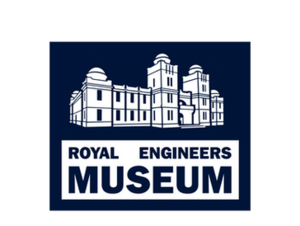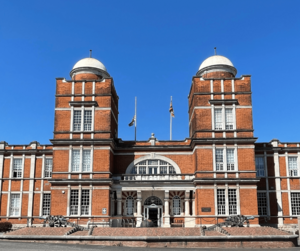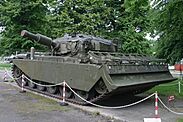Royal Engineers Museum facts for kids
 |
|

The Royal Engineers Museum
|
|
| Lua error in Module:Location_map at line 420: attempt to index field 'wikibase' (a nil value). | |
| Established | 1987 |
|---|---|
| Location | Gillingham, Kent |
| Type | Military Museum |
| Founder | General Sir Charles William Pasley |
| Architect | Major E.C.S. Moore |
| Owner | The Institution of Royal Engineers (InstRE) |
The Royal Engineers Museum, Library and Archive is a cool place in Gillingham, Kent. It's a museum and library that tells the amazing story of the Corps of Royal Engineers. These engineers are like super-smart problem-solvers for the British military. They build bridges, clear paths, and use their skills to help soldiers.
Contents
Discovering the Museum's History
The museum is located in a historic building called the Ravelin Building. This building is part of Brompton Barracks in Chatham. This area has been important for the Royal Engineers for a long time.
How the Engineering School Started
Back in 1812, a smart officer named Colonel Pasley started a special school here. It was called the School of Military Engineering. This school taught soldiers how to be engineers. A year later, in 1813, the Corps’ Library was also created. It still exists today!
Building the Ravelin Building
The Ravelin Building itself was built much later, in 1905. It was first used as a training school for electrical engineers. Captain E.C.S. Moore, who later became a Major, designed the building. It cost about £40,000 to build back then.
The Museum Opens Its Doors
In 1987, the Ravelin Building was turned into the Royal Engineers Museum. Queen Elizabeth II officially opened the museum in May 1987. It has been welcoming visitors ever since.
Amazing Collections to Explore
The museum and library have over 500,000 items! These objects show the history of the Royal Engineers. They also show how military engineering has changed over time. You can see paintings and a huge collection of medals. This includes 25 Victoria Crosses, which are the highest awards for bravery in the British military.
Cool Items You Can See
Imagine seeing a German V-2 rocket from the Second World War! The museum has one. You can also see the map used by the famous Duke of Wellington at the Battle of Waterloo. There's even a piece from the Mahdi's tomb. You can also find weapons used by Lieutenant John Chard during the Anglo-Zulu War. The museum also displays special tanks that lay bridges, a Brennan torpedo, and even a Harrier jump jet!
Different Types of Exhibits
The museum's exhibits are grouped into several exciting areas:
- Engineering Vehicles and Tools: See real artillery, bridge-building equipment like Bailey bridges, and special armoured vehicles. There are also models of railway and water transport. Many full-size vehicles are on display, both inside and outside.
- Weapons and Explosives: Learn about bombs, mines, torpedoes, and even flamethrowers. These show how engineers deal with dangerous situations.
- Communication and Surveying: Discover old telegraph and radio sets. See how soldiers used semaphore flags to send messages. There are also old maps and tools for surveying land.
- Photography and Aerial Views: The Royal Engineers were pioneers in using balloons for military observation. You can see early aerial cameras and photographs.
- Bridge Models: The Bridge Study Centre has hundreds of small models. These show different bridge designs from the 1800s until today.
- Art and Photos: Look at old paintings and drawings of engineering projects. There are also many photo albums showing Royal Engineers units and their work.
- Medals and Awards: This is one of the biggest public collections of medals in the UK. It tells stories of incredible bravery.
See Also
 | Dorothy Vaughan |
 | Charles Henry Turner |
 | Hildrus Poindexter |
 | Henry Cecil McBay |


